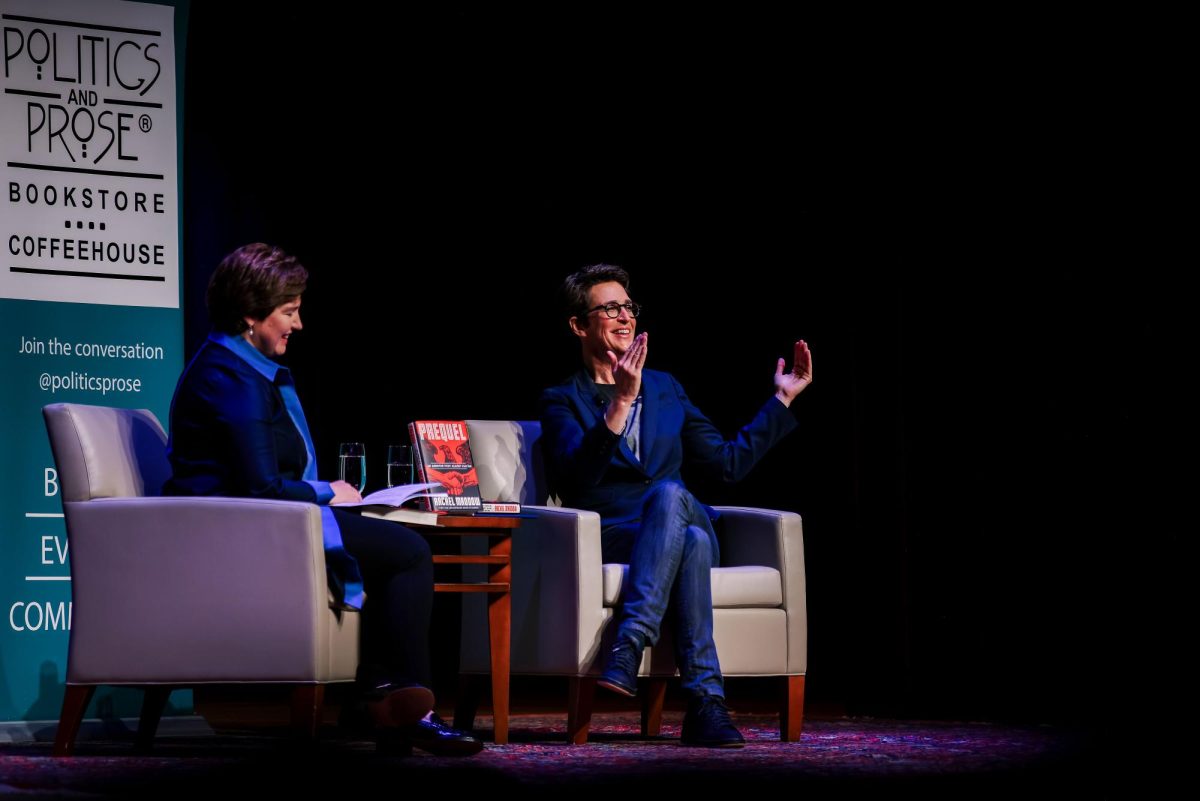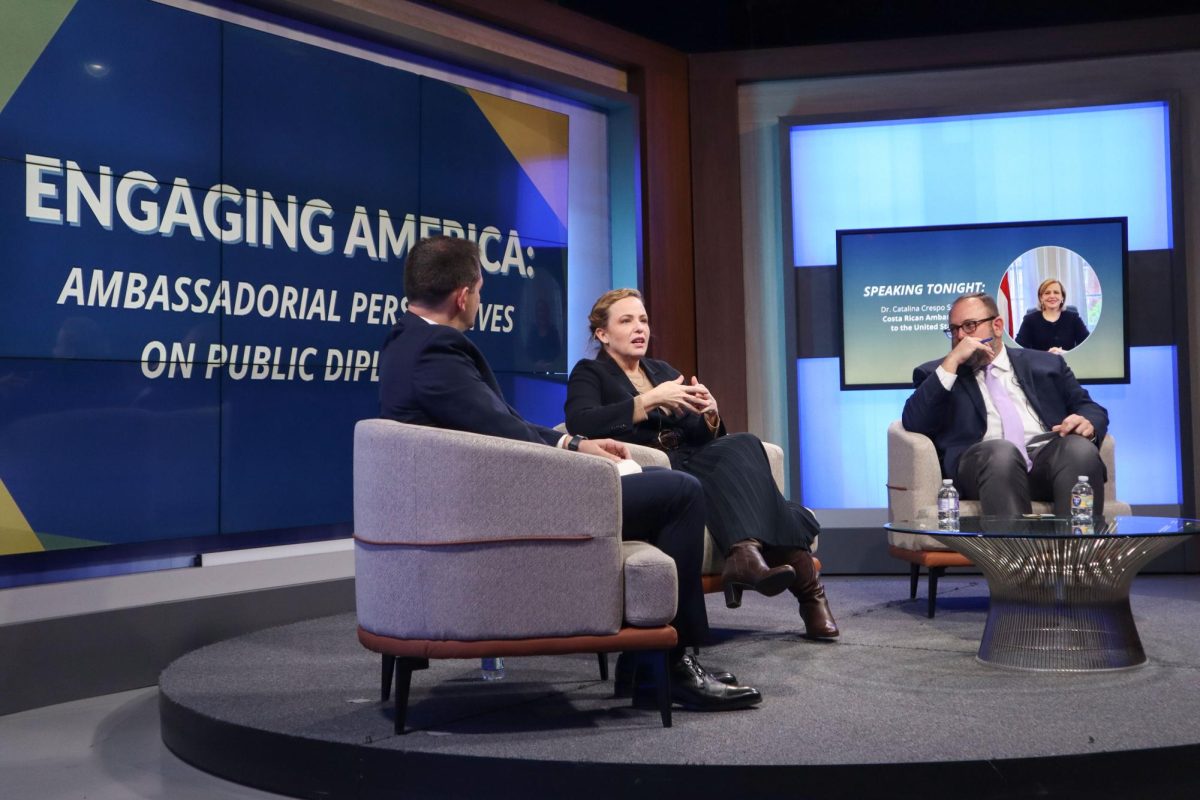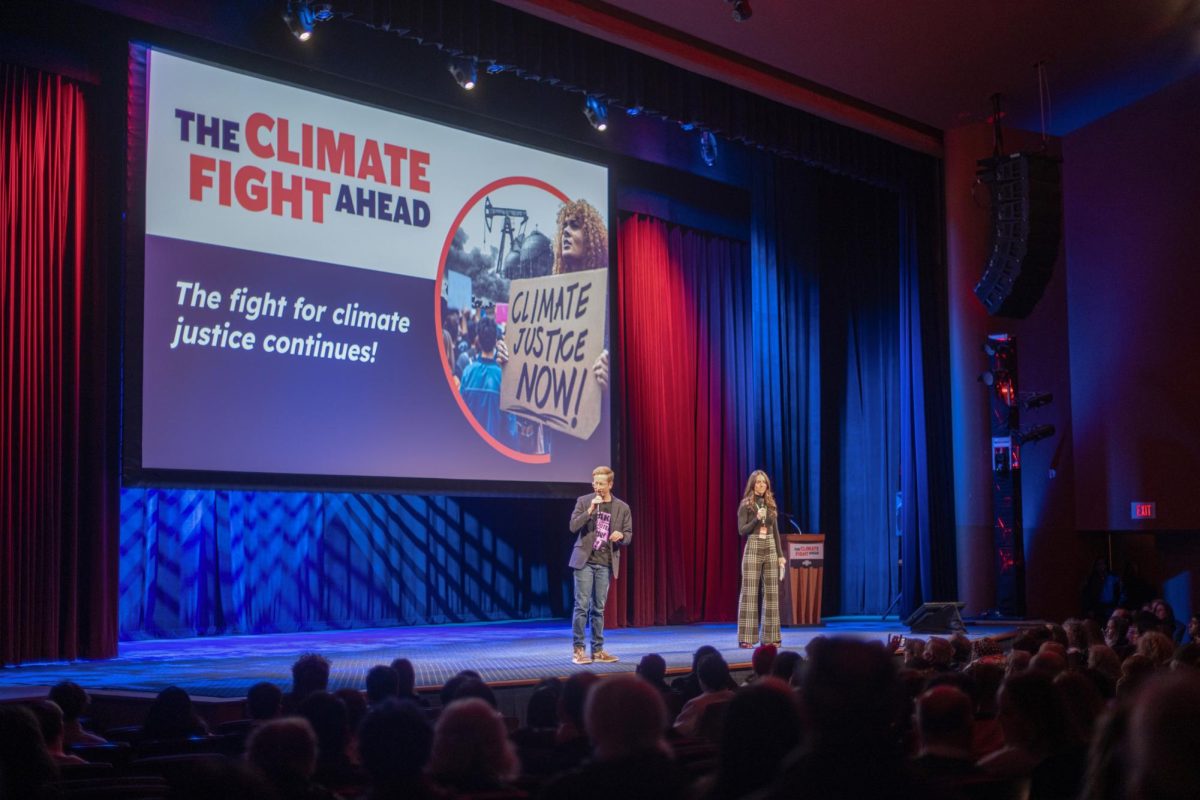Political commentator Rachel Maddow discussed antisemitism and the rise of authoritarianism in the United States at Lisner Auditorium on Wednesday.
Maddow, the host of “The Rachel Maddow Show” on MSNBC, said former President Donald Trump ushered in a form of right-wing politics that is “fundamentally undemocratic.” D.C. bookstore Politics and Prose hosted the discussion with Maddow and Susan Glasser, a staff writer at the New Yorker, about Maddow’s new book, “Prequel: An American Fight Against Fascism.”
Provost Christopher Bracey delivered introductory remarks highlighting GW’s partnership with Politics and Prose, which has yielded conversations with prominent figures like former presidential candidate and Secretary of State Hillary Clinton in 2019, former Secretary of Defense James Mattis in 2019 and actress Kerry Washington in September. Bracey said the University is thrilled to host Maddow, who is at the forefront of some of the “most critical” national conversations in her role as a journalist.
Maddow said there are four cornerstones that indicate a country is becoming more undemocratic: the loss of the “literal art” of democracy — if people can vote and if their votes count — scapegoating, or when people blame a “disfavored” or minority group for the country’s issues, violence entering the political sphere and disinformation. She said all four cornerstones were in question in the U.S. during the years leading up to World War II, which is the period her book focuses on.
“I feel like when those things start getting wobbly, any one of those things starts getting wobbly, heads up,” Maddow said. “When they all start getting wobbly, it’s all hands on deck. We had a moment like that in the lead up to World War II that is a very, I believe, under-told story and that’s why I wrote this book.”
Maddow said there is “no brighter red flag” for the declining health of American democracy than increased antisemitism in the U.S. She said antisemitism is evil but also a “politically operational” way for political factions to sow discord among Americans.
“I started to understand that that’s a political tactic that is attacking not just Jews, but the whole country, so that we don’t ever think of ourselves as groups that can work together as one people and make decisions together,” Maddow said.
Israel declared war on Palestinian militant group Hamas — long designated as a terrorist organization by the U.S. and European Union — on Oct. 8 after the group launched a surprise attack against the country the day before. Israel responded with airstrikes in Gaza, the region of Palestine ruled by Hamas.
Maddow referenced the results of an Oct. 16 Reuters/Ipsos poll which showed 41 percent of Americans favor the U.S.’ support of Israel — nearly double the number of supportive survey participants compared to the 22 percent of Americans in 2014. She said the poll also indicates 78 percent of respondents said U.S. officials should help civilians fleeing Gaza.
Maddow said government leaders need to resolve the conflict in a nonviolent manner, in an effort to preserve the civilian lives caught in the crossfire.
She said she doesn’t know if President Joe Biden will have further success resolving the conflict beyond the “small but important things” he announced Wednesday — a deal for Israel to allow food, water and other supplies from Egypt into Gaza.
“Ultimately, where we have to get to in this country and around the world with this issue is a place where things are settled through politics and through discussion and not through the gun,” Maddow said. “It’s a harrowing time.”
Maddow said her book focuses on the stories of the “good guys,” or Americans who stood up against American pro-Nazi groups like the German American Bund in the U.S. before and during WWII. She pointed to attorney and GW alum Leon Lewis, who led efforts to expose plots by the Nazis to carry out violent antisemitic attacks in Los Angeles throughout the 1930s and ‘4os.
Lewis, whom Nazis called “the most dangerous Jew in Los Angeles” for his efforts, also helped found the Anti-Defamation League, a Jewish nonprofit organization dedicated to combating antisemitism and extremism.
“It was Leon Lewis, an American hero, an incredibly brave man who did that and he not only has been lost until recently to history, but even in his own time was not appreciated for having done this singly important thing, I think, for U.S. history,” Maddow said. “It wasn’t even mentioned in his own obituary when he died.”
Maddow said she talks about international news on her show to analogize issues in other countries to the U.S. She said one of these issues, authoritarianism, is rising around the world, including in the U.S. Thirty-eight percent of the world’s population live in “not free” countries — countries with a low degree of political rights and civil liberties — the highest proportion since 1997, according to a 2022 Freedom House report.
“All fair observers would say we’re having another authoritarian moment in global politics right now,” Maddow said. “And again, those winds blow across our borders as well.”











